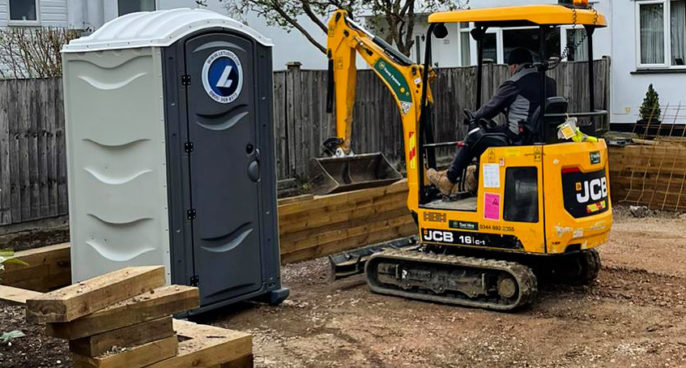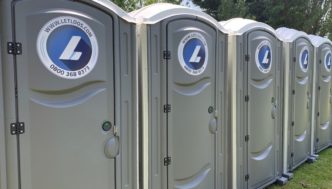
Do I Need Welfare Facilities on My Liverpool Site?
From historic conversions along Castle Street to sleek new apartments in areas like Queen’s Dock and the Baltic Triangle, Liverpool’s building and construction industry is booming. Naturally, the spike has increased demand for welfare facilities on site.
The Health and Safety Executive (HSE) has a big presence in Liverpool. This means it’s more important than ever for clients, contractors and site managers to understand their responsibilities when it comes to welfare facilities.
No need to stress. The HSE makes it easy to comply with clearcut guidelines about welfare facilities on site. That said, as a site manager it’s important to do your homework and understand exactly what services you need to provide. Requirements will usually vary between sites. You’ll need to factor in things like how many employees will be working on your site and the nature of the construction project.
Want to know more about your welfare facilities on site responsibilities? We’ve got you covered. Read on as we cover everything you need to know about welfare facilities on Liverpool sites.
Table of Contents
- 1 Liverpool’s building and construction boom
- 2 Who is responsible for welfare facilities on site?
- 3 What welfare facilities need to be provided?
- 4 How many toilets do I need on my Liverpool site?
- 5 Where to position welfare facilities
- 6 Are public welfare facilities suitable?
- 7 What about remote sites?
- 8 What if my Liverpool site doesn’t comply?
- 9 Bring your welfare facilities up to par
Liverpool’s building and construction boom
Let’s take a minute to spotlight the Liverpool building and construction boom. Over the past two decades, Liverpool has emerged as one of the fastest growing cities in England. Outside of London, the Merseyside city has enjoyed impressive economic growth. Latest figures and forecasts by Avison Young state that Liverpool’s economy is forecast to grow by nearly 6% during 2022.
From large-scale residential apartments and commercial builds to small home renovation projects, construction in Liverpool is exploding. As mentioned earlier, this goes hand-in-hand with increased demand for welfare facilities.
The role of the HSE
When it comes to workplace health and safety, the UK takes things very seriously. In fact, the government has devoted an entire unit to keeping British workers safe in the workplace. It’s called the Health and Safety Executive and it offers clearcut guidelines on how to keep employees safe and comfortable in the workplace. The building and construction industry is no exception. Like bankers, teachers and frontline healthcare workers, building and construction employees must have access to clean, comfortable and hygienic welfare facilities on site.
Recent changes to the Building Safety Act named the HSE as the official Building Safety Regulator. This means the HSE lays down the laws when it comes to welfare facilities on Liverpool sites.
The importance of welfare facilities
Before we get stuck into the nitty gritty of welfare facilities on construction sites, let’s take a moment to define exactly what the term means. Welfare facilities don’t just refer to toilets, though of course these are very important. The term also encompasses facilities used to wash, change, eat and rest.
You don’t necessarily need a full range of welfare facilities on your site. However, toilets are a must. Access to wash stations, changerooms, meal areas and rest zones will depend on the unique needs of your site.
“Welfare is a fundamental and basic necessity for workers. It is also required by law,” states the HSE website. “Providing the right welfare sets the tone for a project and demonstrates a commitment to meeting workers’ needs.”
We get it – building and construction is a busy and fast-paced industry. But that doesn’t mean you can drop the ball when it comes to welfare facilities. At a glance, be prepared to provide the following welfare facilities on your Liverpool site:
- Clean and functioning toilets, either flush or chemical
- Washbasins with running water
- Soap and/or hand sanitiser
- Sinks to wash the face, hands and forearms
- A clean and dry space to change and store clothing/personal belongings
- Clean drinking water
- A designated rest/eating area
Who is responsible for welfare facilities on site?
In 2017, amendments to the Construction (Design and Management) Regulations made welfare facilities the legal responsibility of foremen and site managers. The update was designed to ensure all employees and visitors have access to clean and comfortable sanitation facilities.
According to the Health and Safety Executive website, construction site welfare facilities are the responsibility of both contractors and clients.
“Contractors are required to provide welfare facilities and clients must ensure this happens,” reads the website. Contractors are required to provide welfare facilities for all workers, from the start of the project until the final day of construction. Clients must follow up and ensure contractors have finalised arrangements. These rules apply to all construction sites, regardless of size. Cooperation is encouraged, with the HSE stating clients should collaborate with contractors when necessary and offer help when providing welfare facilities proves difficult.
To simplify the process, the HSE recommends “decisions and action on this need to be taken at an early stage of project planning.”
What welfare facilities need to be provided?
As a general rule, the HSE states “everyone who works on a construction site must have access to toilets and facilities for washing, changing, eating and rest.” From here, things start to get a little more complicated. While all construction sites must provide employees with access to welfare facilities, the exact nature of the facilities will vary depending on a variety of factors.
This can include the nature of the work and duration of the project. How many workers will be onsite, and the environmental conditions faced by employees can also affect requirements. The location of the construction site should also be considered.
Toilets at Liverpool sites
Construction site managers can choose from two main types of toilets – flush and chemical. We take a closer look at each below:
- Flushing toilets
These are always preferable, where possible. To install flush toilets, the site must have access to a mains water supply and drainage systems. This setup is ideal for construction projects with long timelines. Alternatively, flush toilets with built-in water tanks and drainage can be installed.
- Chemical toilets
Where flush toilets can’t be installed, portable chemical toilets are a good alternative. Also known as plastics in the industry, these toilets are common on small construction sites and projects with short timelines. Chemical toilets can also be used to complement permanent welfare facilities when additional employees are expected onsite.
How many toilets do I need on my Liverpool site?
How many toilets your site requires will depend on the type of toilet you choose and how many workers are onsite.
If you plan to use chemical toilets, the HSE recommends one toilet per seven people on a 40-hour per week schedule. Remember, this is a general guideline and will also depend on how often the chemical toilets are emptied, serviced and restocked. For more information, check out our complete guide to construction site toilet numbers.
For flush toilets, the numbers vary depending on whether the toilets are for mixed or women-only teams, or for men-only teams. If you’d like to learn more, please consult this table published by the HSE.
Washing facilities at Liverpool sites
Depending on the nature of the construction site, washing welfare facilities may also be a legal requirement. Ideally, these should be placed next to the toilets and should include the following features:
- Access to clean, running water. This can be cold, warm or hot depending on the unique needs of the site. Water should flow into sinks or wash basins large enough to wash the hands, face and forearms. While some portable toilets feature sinks, they may not be large enough to meet the legal requirement of a site that requires full washing facilities
- Soap, hand sanitiser or another form of cleaning agent
- Paper towels or another form of hand drying cloth
- Sufficient lighting and ventilation
- Showers may also need to be installed, depending on the type of work being done on the construction site
- Ideally, hand washing stations shouldn’t be in locations used for eating and drinking. If employees are exposed to hazardous materials like lead and cement, keeping washing stations separate from eating and drinking sites is critical
Where to position welfare facilities
Planning ahead is the best way to make the most of your welfare facilities and ensure your Liverpool construction site meets legal requirements. Some things to consider when planning include:
- How many employees will be working on the site?
- Proximity to the construction site. Larger sites may need to offer multiple toilets and washing facilities to accommodate workers in different areas.
- Whether your welfare facilities will need to be moved during the project
- Can the welfare facilities be accessed by cleaning and maintenance teams?
Are public welfare facilities suitable?
Yes, depending on the nature of your project and the size of your team it is possible to use public welfare facilities. However, there is quite a lot of red tape involved. For example, if you plan to utilise public toilets, you’ll need permission from the local council or appropriate body. Similarly, you can’t simply send workers to a nearby café without a formal agreement with the owner. You’ll need to make sure your chosen welfare facilities are available at all times while workers are onsite. It’s also your responsibility to ensure the welfare facilities are clean and stocked with necessities like soap, toilet paper and towels.
As well as being inconvenient, offsite toilets can often be a buzzkill when it comes to productivity. Having to travel offsite every time nature calls can waste hours of worktime and slow down your project. Inconvenience aside, travelling offsite can result in employees “holding it in” and using the toilet less frequently. This not only promotes dehydration but can have a big impact on morale. Disgruntled employees translates to poor productivity and results in a high staff turnover.
With so much at stake, we generally recommend providing your own welfare facilities on site. It’s easy, affordable and offers complete peace of mind your site complies with HSE regulations.
What about remote sites?
From highway repair work to rural construction projects, remote sites must meet the same strict HSE requirements as their urban counterparts. All workers must have access to welfare facilities, regardless of location. Mobile units are usually a great option and offer employees access to clean and well-equipped welfare facilities on site.
Managing a demolition site? You’ll still need to ensure your employees have access to flushing or chemical toilets, as well as any other welfare facilities required by your site. This could include hot running water, showers and a rest room that’s clean, dry and warm.
What if my Liverpool site doesn’t comply?
Local Liverpool inspectors take health and safety seriously. If your site doesn’t meet welfare facility standards, you could be issued an improvement notice and a timeline to bring your site up to scratch. If you fail to update your site within the timeline you could receive a fine for failing to provide welfare facilities, as well as failure to comply with the notice. You may also be asked to pay prosecution costs. These can quickly add up and exceed £10,000. In almost all cases, the cost of providing welfare facilities on site is far less than the fines of noncompliance.
Bring your welfare facilities up to par
Not to worry, complying with HSE laws is easy with the right experts on your team. At LetLoos, we offer a huge range of portable welfare facilities designed to make your construction site clean, comfortable and above board. Whether you’re after mains-connected flush toilets for an urban project or portable, self-contained solutions for a remote site, we have it covered. Check out our website for a complete rundown of specialised construction hire services for Liverpool sites.



